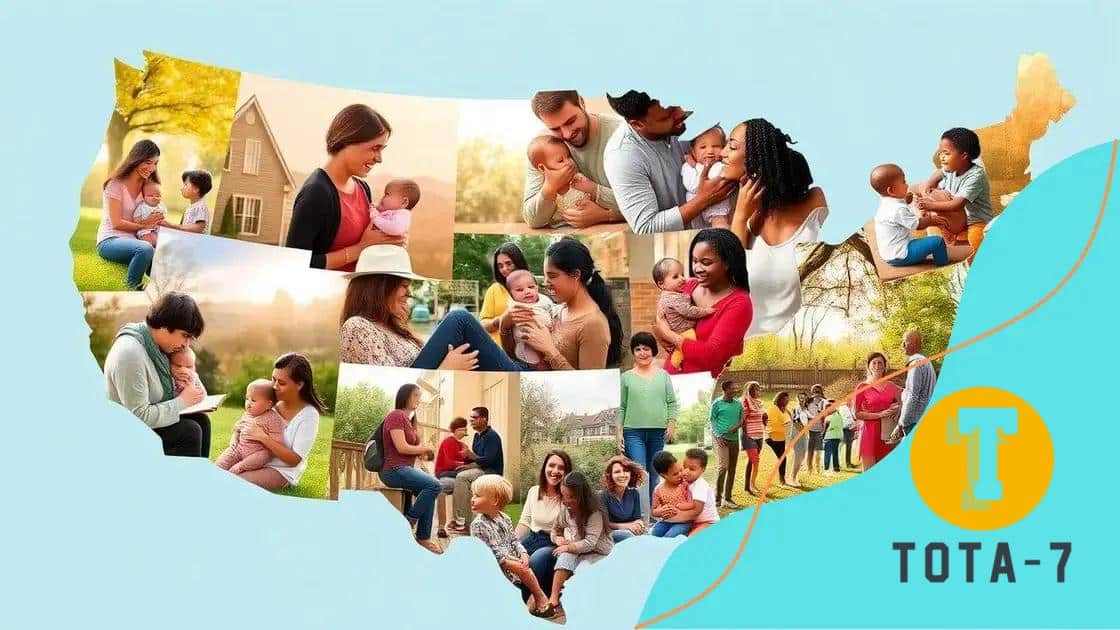Universal baby bonds gain policy traction quickly

Universal baby bonds are government-sponsored financial accounts for newborns, designed to reduce childhood poverty and provide equal opportunities for families by accumulating funds until the child reaches adulthood.
Universal baby bonds gain policy traction as a promising approach to tackle economic inequality. But have you thought about how they could shape the future for millions of children? In this article, we’ll delve into the concept and its implications.
Understanding universal baby bonds
Understanding universal baby bonds is crucial in today’s dialogue on economic equality. These bonds are designed to provide financial resources for children at birth, giving them a head start in life. How do these bonds work, and what benefits do they offer?
What are Universal Baby Bonds?
Universal baby bonds are government-sponsored programs that grant a financial account for every child born within a specific system. Typically, the funds are managed until the child reaches adulthood. The main idea behind these bonds is to reduce the impact of wealth inequality by providing equal financial opportunities for children, regardless of their family’s economic status.
Benefits of Universal Baby Bonds
- Reduces economic disparity
- Encourages saving and investment
- Supports long-term education and homeownership
Furthermore, universal baby bonds can foster a sense of financial security, helping parents feel more confident about savings for their children’s future. With these bonds, every child can envision a more stable financial future.
Real-World Examples
Several regions are already experimenting with universal baby bonds. For instance, some states in the U.S. have implemented pilot programs that aim to provide these funds. Such initiatives show promise in shaping discussions around policy changes for the betterment of children across different socioeconomic backgrounds.
This revolutionary approach is gaining attention because it directly addresses factors that contribute to *economic inequality*. If implemented on a broader scale, these programs could significantly impact future generations while equipping them with necessary resources.
The potential impact on childhood poverty

The potential impact on childhood poverty from universal baby bonds is significant and compelling. By providing financial resources at birth, these bonds can help break the cycle of poverty for many families.
How Universal Baby Bonds Work
Universal baby bonds accumulate funds over time, ideally managed until the child reaches adulthood. This means that the earlier a child receives a bond, the more money they will have to access when they are preparing for their future. With these funds, children can afford higher education or even start a business.
Benefits for Reducing Poverty
- Helps cover educational expenses
- Enables savings for homeownership
- Reduces long-term financial stress
By addressing financial barriers, universal baby bonds can create opportunities for children from low-income families. This approach not only supports individual children but also aims to uplift entire communities.
Furthermore, studies have shown that financial security for children positively affects their mental and emotional well-being. When families know that their children have financial support, it reduces their anxiety about the future. A sense of stability can lead to better educational outcomes and stronger community ties.
Long-Term Effects on Society
The long-term effects of universal baby bonds go beyond just benefiting individuals. When children have access to funds, they are more likely to contribute to the economy as productive adults. This cycle can lead to reduced government expenditures on social services, as fewer families will require assistance.
In a broader context, reducing childhood poverty with universal baby bonds can reshape society. Investments in our children’s futures mean investing in a stronger economy, healthier communities, and a more equitable world.
Policy support and public opinion
Policy support and public opinion play a crucial role in the success of universal baby bonds initiatives. As more people become aware of the potential benefits, public opinion is shifting in favor of these programs.
Current Legislative Support
Several lawmakers have begun to advocate for universal baby bonds. These politicians argue that such policies can help level the playing field for all children. Discussions around funding and implementation are gaining traction in various state legislatures.
Public Sentiment
- Surveys show increasing support for universal baby bonds among parents.
- Many believe these bonds can provide vital resources for education.
- The prospect of reducing childhood poverty resonates with a wide audience.
As more families express the need for financial support at an early age, the public narrative around universal baby bonds is becoming more positive. This growing interest among citizens often translates to increased pressure on policymakers to take action.
Grassroots Movements and Activism
Grassroots movements are essential in gaining visibility for universal baby bonds. Community organizations are actively engaging with citizens, helping them understand how these bonds can change lives. By organizing events and educating families, activists are creating a buzz that encourages more discussions and support.
Their efforts highlight the emotional aspect of economic inequality and the importance of providing all children with equal opportunities. As these voices become louder, they play a pivotal role in shaping legislative agendas and influencing public opinion.
In summary, the path to implementing universal baby bonds relies heavily on robust policy support and a favorable public opinion. Advocates are hopeful that as more people recognize the potential benefits, these programs will gain the necessary momentum to become a reality.
Examples from different states

Looking at examples from different states can provide insight into how universal baby bonds are being implemented in various contexts. Policymakers across the country are testing different models to see how these initiatives can make a real difference.
California’s Baby Bond Program
California is one of the leading states exploring universal baby bonds. The program aims to provide financial support to low-income families as their children grow. Every child born into a family receiving government assistance will receive a bond that accumulates savings until they reach adulthood. This initiative focuses primarily on reducing economic disparities.
Connecticut’s Initiative
Connecticut has also proposed a baby bond program. This program will offer children a specific amount of money that will grow over time, intended for their education and future investments. The state hopes to improve access to educational opportunities for children from varied socioeconomic backgrounds.
Other States Testing Variants
- New Jersey is considering a pilot program similar to California’s.
- Illinois is researching the feasibility of implementing a savings program for children.
- New York is exploring ways to integrate these bonds into existing child support systems.
Overall, different states are approaching universal baby bonds from unique angles. They are tailoring their programs to address specific community needs, reflecting their commitment to reducing childhood poverty. As these pilot programs unfold, they serve as valuable case studies for future initiatives.
By examining these examples, it becomes clear how universal baby bonds can be adapted to meet various objectives. Each state’s experiment provides a blueprint for potential future legislation across the nation.
Challenges and considerations for implementation
Implementing universal baby bonds comes with its own set of challenges and considerations. Understanding these obstacles is critical for policymakers and advocates.
Funding and Budgetary Constraints
One of the most significant challenges is securing enough funding to support these programs. Governments must balance new initiatives with existing budget commitments. This might require reallocating funds from other areas or finding new sources of revenue.
Equity in Access
Ensuring that all families have equal access to universal baby bonds is essential. Policymakers must consider how to reach families who may not engage with traditional systems. This includes families in rural areas, non-English speakers, and low-income households. Outreach and education are vital to ensure broad participation.
Public Awareness and Education
- Many people are unaware of what universal baby bonds are.
- Effective communication strategies are needed to inform the public.
- Engaging community organizations can aid in spreading the word.
In addition, public education about how to utilize these funds effectively can determine the success of the program. Families need guidance on how to plan for their child’s future using the resources available through these bonds.
Potential Political Resistance
Political support can fluctuate, depending on changing administrations and priorities. Some policymakers may oppose universal baby bonds due to differing views on welfare and government spending. Building broad bipartisan support is key to overcoming this challenge.
Moreover, ongoing evaluations of the programs are necessary to ensure they are achieving their intended goals. Regular assessments will help adapt the programs to better serve families and respond to any emerging issues.
FAQ – Frequently Asked Questions about Universal Baby Bonds
What are universal baby bonds?
Universal baby bonds are government-sponsored accounts established for every child, providing financial support to give them a better start in life.
How do universal baby bonds help reduce childhood poverty?
By providing financial resources from birth, these bonds aim to give low-income families better opportunities for education and economic security.
What challenges do policymakers face in implementing these programs?
Key challenges include securing funding, ensuring equitable access, and overcoming political resistance to new initiatives.
Which states are currently testing universal baby bond programs?
States like California, Connecticut, and New Jersey are exploring different models to implement universal baby bonds, reflecting diverse approaches to tackling childhood poverty.





